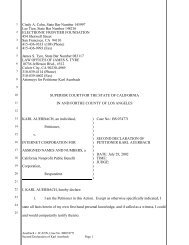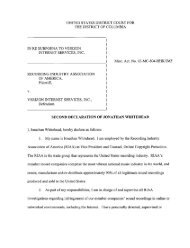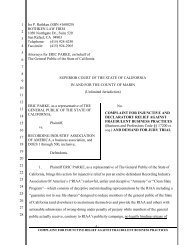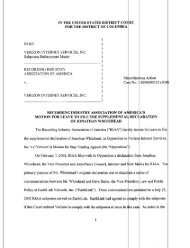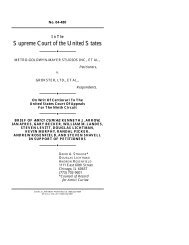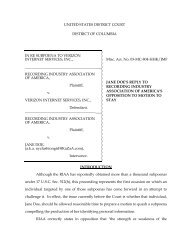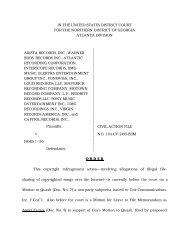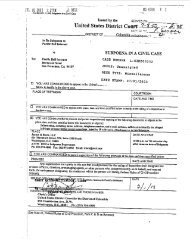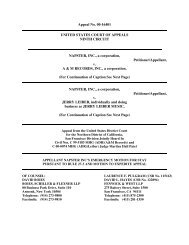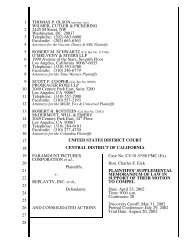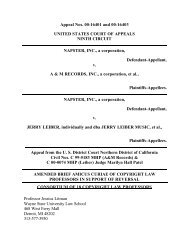Outline of Amicus Brief: Pavlovich v
Outline of Amicus Brief: Pavlovich v
Outline of Amicus Brief: Pavlovich v
- No tags were found...
Create successful ePaper yourself
Turn your PDF publications into a flip-book with our unique Google optimized e-Paper software.
Moreover, Bunner had neither a contractual nor a fiduciary<br />
relationship with DVD CCA that could be said to impose a duty on him to<br />
maintain the confidentiality <strong>of</strong> CSS. Thus his republication <strong>of</strong> the program<br />
does not implicate one <strong>of</strong> the fundamental concerns <strong>of</strong> trade secret law,<br />
“[t]he maintenance <strong>of</strong> standards <strong>of</strong> commercial ethics.” Kewanee Oil Co. v.<br />
Bicron Corp., 416 U.S. at 481-82. 10<br />
Rather than being a typical trade secret case, the issues presented<br />
here bear a striking resemblance to those before the Supreme Court in<br />
Bartnicki v. Vopper, 532 U.S. 514. In Bartnicki, the Supreme Court was<br />
asked to decide whether the federal wiretap statute, 18 U.S.C. § 2511(1)(c),<br />
which prohibits the disclosure <strong>of</strong> an illegally intercepted communication,<br />
could be enforced in an action for damages against an individual and two<br />
radio stations who lawfully obtained, and subsequently disclosed the<br />
contents <strong>of</strong>, a tape <strong>of</strong> an illegally intercepted cell phone conversation. Like<br />
10<br />
Although trade secret law furthers the additional interest <strong>of</strong><br />
protecting creative endeavors, see id., this interest cuts two ways. On the<br />
one hand, there is an interest in protecting the creative endeavors <strong>of</strong> those<br />
who create a new product. On the other hand, there is an interest in<br />
encouraging the expansion <strong>of</strong> knowledge that results by permitting others to<br />
build on work that has gone before. As discussed in the amicus brief<br />
submitted by the Intellectual Property Law Pr<strong>of</strong>essors and the Computer &<br />
Communications Industry Ass’n, trade secret law strikes a balance by<br />
allowing trade secret information to be acquired through reverse<br />
engineering. See Kewanee Oil Co. v. Bicron Corp., 416 U.S. at 476;<br />
Chicago Lock Co. v. Fanberg, 676 F.2d 400 (9 th Cir. 1982); Cal. Civ. Code<br />
§3426.1(a) (excluding reverse engineering as an “improper means” <strong>of</strong><br />
acquiring trade secret information).<br />
17



